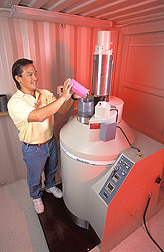This page has been archived and is being provided for reference purposes only. The page is no longer being updated, and therefore, links on the page may be invalid.
|
Read the magazine story to find out more. |
Winning the Fruit Fly Battle in HawaiiBy Kim KaplanFebruary 6, 2004 Agricultural Research Service scientists in Hawaii are leading the first successful effort to deal with the exotic fruit flies that have devastated Hawaiian farms and gardens for a century. The program is not only controlling fruit flies and improving Hawaiian agriculture, but also may help keep foreign fruit flies out of the United States. If exotic fruit flies became established in California, the direct and indirect losses could amount to $1.4 billion annually in that state alone. The Hawaii Area-Wide Fruit Fly Integrated Pest Management Program (HAW-FLYPM) is under the direction of ARS entomologist Roger Vargas at the agency's U.S. Pacific Basin Agricultural Research Center in Hilo, Hawaii. The program, a joint effort of ARS, the Hawaii Department of Agriculture and the University of Hawaii, depends primarily on a system of field sanitation, biological controls and lures, rather than chemical insecticides. Growers on three Hawaiian islands have already been recruited as cooperators, and more are joining every growing season. Aloun Farms, one of the largest and most diversified farms in Oahu, has already been able to reduce its insecticide use by 60 to 70 percent. By enabling farmers to cut back on insecticide spraying, the program benefits the Hawaiian environment. Fruit fly control is also allowing farmers to grow more types of crops. Because of fruit fly problems, Earl Yamamoto of B.E.S.T. Farm in Waimea had been limited to growing peppers and melon crops. Now he's experimenting with blueberries and has added zucchini and persimmons. Persimmons are a popular fruit crop in Hawaii, but many orchards were abandoned as fruit fly problems worsened. Now, persimmon trees are being planted again, and harvests are increasing. Read more about this research in the February issue of Agricultural Research magazine. ARS is the U.S. Department of Agriculture's chief scientific research agency. |

